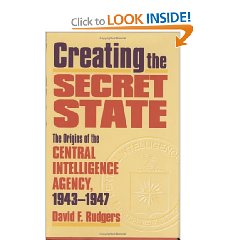October 13, 2000
David F. Rudgers
This is an admirable and unusual work, of doctoral-level quality in its sources and methods, while also reflecting the professional intelligence career status of the author. It complements Amy Zegart's broader book, Flawed By Design, in an excellent manner. This book, focusing as it does on the CIA alone, and on internal sources not readily available to Zegart, fills a major gap in our understanding of the CIA's origins. The author excels at demonstrating both the actual as opposed to the mythical origins of the agency, and pays particular heed to the role of the Bureau of the Budget and that Bureau's biases and intentions. At the end of it all, the author notes that the agency was moving in controversial directions within four years of its birth, quickly disturbing Harry Truman, who is quoted as saying, twenty-years after the fact (in 1963), “For some time I have been distributed by the way CIA has been diverted from its original assignment. It has become an operational arm and at times a policy-making arm of Government….I never had any thought when I set up the CIA that it would be injected into peacetime cloak-and-dagger operations.” The author himself goes on to conclude that “the nature of the new threats and the revolution in information acquisition and dissemination have thrown traditional ways of intelligence organization, collection, evaluation, and distribution into question. … CIA has entered the second half-century of its existence striving to avoid the fate of its OSS parent. In the process, it is groping for new missions and purposes while blighted by the legacy of its past derelictions, and while operating amid a rapidly changing global environment and technological revolution that are rendering its sources, methods, organizations, and mystique obsolete.” I would hasten to add, as my own book documents, that we will always have hidden evil in the world and will always needs spies and secret methods to some extent, but this book, combining academic rigor with insider access, must surely give the most intelligent of our policy, legislative, and intelligence managers pause, for it very carefully documents the possibility that 75% of what we are doing today with secret sources and methods need not and should not be done. This book has much to offer those who would learn from history.





